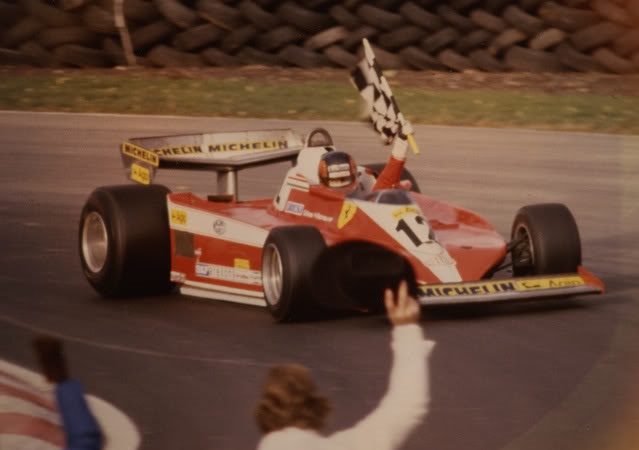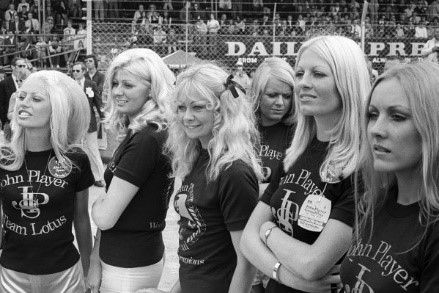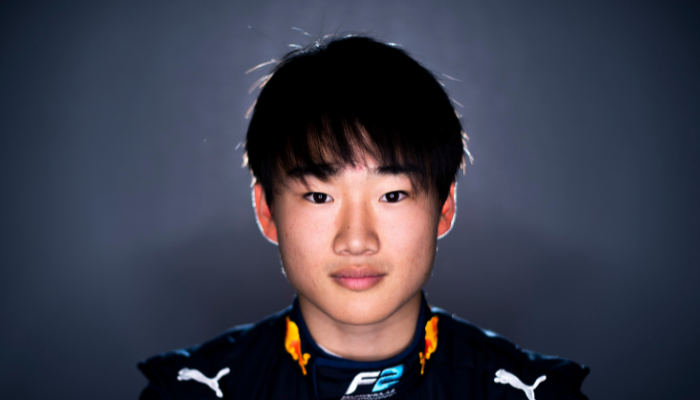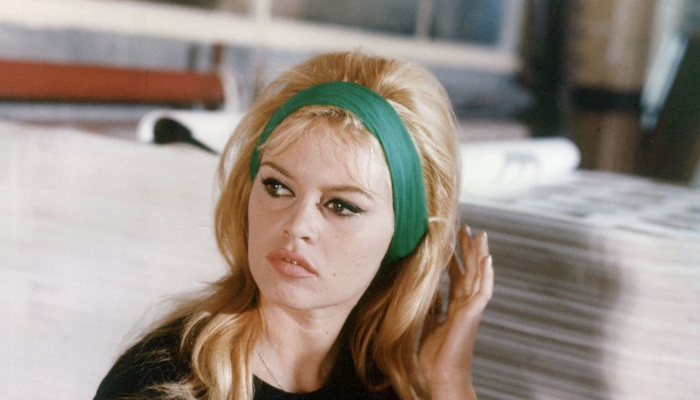
Gilles Villeneuve, winner of Canadian Grand Prix at Montreal in 1978.
When Jean Alesi, in a Ferrari bearing the fabled number 27, took the flag on his birthday at the circuit named after his hem, Gilles Villeneuve, the symbolism was very powerful; just as it had been at Imola in 1983 when Patrick Tambay — also in 27— triumphed, a year after Villeneuve's death.
Montreal will be forever imbued with the spirit of Gilles and many of those who cheered Alesi would have been there for the first race in October 1978. At the original circuit, the average speed was barely over 100mph, but 80,000 spectators came in to see Canada's new hero. Villeneuve, a Ferrari driver in his first full F1 season, had yet to win a race, but was acknowledged as the most exciting rookie in a generation.
In itself, it was hardly a memorable race, but satisfactory, for after the Lotus and the Williams had problems, the Ferrari came through to win. While the most extrovert driver ever seen out of the cockpit, Gilles was usually the calmest of men. Later he is known to have said that he could remember nothing of it, that it was all a blur. "It might sound crazy, but I felt embarrassed, in away. Everyone was on top of me, laughing and crying and slapping me on the back, but somehow l didn't feel part of it, it was like someone else had won. Pierre Trudeau [then Canada's Prime Minister] came up to the podium, waving a Ferrari flag and it just seemed unreal this was all for me."
"It seemed to me", James Hunt said, "that Gilles did everything possible not to win the title that year. There was no doubt he had massive natural talent and he was the out-and-out quickest driver in the world but surely the main reason anyone goes racing is to win the world championship, isn't it?"
Well, no, not in Villeneuve's mind. "For me, the thing is to win races," he once said "and the way I figure it is that if you do that enough, the title will follow automatically. But cruising sometimes, looking for points no way! Winning the championship like that would mean nothing to me. Hey, remember, Stirling Moss and Ronnie Peterson never won it, but look at some of the guys who did."
In 1979 only Scheckter and Villeneuve could win the championship and the position was that if Jody won the Italian Grand Prix, the title was his. Traditional Ferrari team orders were that if and when the Scuderia's cars became 1-2, the driver in front at the time should win the race. By lap 13, that was the situation, with Scheckter just ahead of Villeneuve.
Gilles was asked afterwards if he could have passed Jody. He smiled. "I hoped like hell he'd break! But if I'd passed him, it would have been like breaking my word."
All right, but had there not been the temptation at least to lead for a few laps?
"Well, it would have been false, wouldn't it? And not a particularly nice thing to do, either, because this was Jody's day."
In the last two races, at Montreal and Watkins Glen, it was obvious that the two front runners would be Villeneuve and Jones. At the lle Notre-Dame, there was enthusiasm for the circuit changes, for the tight right and left after the pits (then situated immediately beyond the hairpin) had become flat-out sweepers, and lap times were eight seconds quicker than the year before.
Gilles took an immediate lead. Alan was well aware it would take much work to get by him: "Frank and I had agreed that if he beat me away at the start, which was always on the cards with Gilles, I wouldn't try any kamikaze moves to get past, but instead keep with him and let the race settle down." At the end of lap 51, Jones made his move, shooting down the inside and leaning the Williams up against the Ferrari. It was hard but fair and typified the way these two would always fight.
"I always loved racing against Gilles," Alan said, "because if he knew you'd won the corner, he'd always give you mom okay, maybe only a foot more than you needed, but you knew the gap wouldn't close once you were into it. And because of that, I'd do exactly the same for him.”
"Once I'd got by, I thought, 'I've done it' and I built up a bit of a cushion, three seconds or so. But, as soon as I backed off a fraction, there was that shit box, up with me again. I tell you, it got to the stage that year when I thought the mechanics had painted my bloody mirrors red.”
"Villeneuve was unbelievable like that; I mean, he never gave up. I never felt bad about a win in my life, you know, but I couldn't help feeling a bit sorry for Gilles that day. It was his home race and he just drove the wheels off that thing."
When they got to the podium, Gilles looked happier by far than a year earlier, when he had stood on the top step.
"Sure, I won in '78," he said, "but only because Jarier retired. Inheriting a victory, even my first one, even in Montreal, never gave me much pleasure. Today I had to fight and that's what I love. That's why I'm a racing driver."

The accident of Riccardo Paletti. Photo by archives The Canadian Press.
1982, the “cursed” year of the Canadian Grand Prix. By Sébastien Templier, LA PRESSE. Updated June 18, 2012.
Young Italian Riccardo Paletti crashed into the rear of Didier Pironi's single-seater, which was stalled on the grid. He died instantly.
Away from the world of Formula 1, but never far from the paddocks, Normand Legault still feels the same sense of fear inherent in the risks taken by Formula 1 drivers on the starting grid and in races. An anxiety that dates back more than 30 years.
In the spring of 1982, Canadian motorsport experienced the darkest period in its history. "A cursed period for Canada," as the former promoter of the Montreal Grand Prix called it.
The Montreal race was held in June that year. Legault and his team had convinced Bernie Ecclestone to move the Thanksgiving weekend race to the spring. Ironically, this premiere took place in freezing, gray weather. The atmosphere in Montreal was "special." Gilles Villeneuve had been killed on the Zolder circuit five weeks earlier.
A disastrous première
For Riccardo Paletti, this Sunday 13 June 1982 was also a première. The 23-year-old Italian was about to make his first real start on the grid in a pack. He was making his debut in the Formula 1 World Championship with the modest Italian team Osella. And he wasn't lucky. Having failed to qualify for five rounds of the season and forced to retire at Imola, he was involved in an accident during the morning warm-up of the United States Grand Prix.
“Some people wondered if he was ready for Formula 1,” Normand Legault recalls.
At the start Didier Pironi, in pole position, stalled on the grid. The cars following behind avoided him without too much difficulty. "At the back of the grid, Elio De Angelis swerved and narrowly avoided Pironi," Normand Legault said. "Paletti saw Pironi at the last moment and didn't have time to brake. At 215 km/h, in third gear, at 13,500 rpm, he hit the rear of the car. The front was the most vulnerable part of an F1 car at the time. He died instantly."
In front of his parents.

The accident of Riccardo Paletti. Photo by Michel Gravel, archives The Canadian Press.
After the impact, Riccardo Paletti's car caught fire. But it was already too late.
The memory of Villeneuve
Riccardo Paletti is the only driver to die on the Gilles-Villeneuve circuit to date.
Gilles Villeneuve had died the previous month. Two deaths in one month are a lot. Too many.
When the Quebec driver's death was confirmed on 8 May 1982, during the Belgian Grand Prix, it came as a "huge" shock. Villeneuve was the local driver, having won in Montreal a few years earlier in his first Grand Prix in the city. Unusually these days, he was the race's spokesperson at the time.
"Gilles was very present in the Grand Prix marketing campaign. At the time, the Grand Prix was a subsidiary of Labatt, which had been Gilles' personal sponsor since his years in Formula Atlantic. Gilles was very loyal to the Grand Prix," says Normand Legault, the event's general manager at the time.
The driver's death shook everyone. Two days later, the promotional campaign for the Canadian Grand Prix was to be launched. "We had to redo everything, from the tickets to the placemats."
But Normand Legault had other priorities in the aftermath of the death. "On Sunday, I went to Gilles's parents' house in Berthierville with Mrs. Parent, the wife of Gaston Parent, Gilles's manager, to make funeral arrangements. On Monday, I was going to choose the coffin. His parents were not young and they were overwhelmed by the events. Joann, Gilles's wife, was in Monaco at the time."
Montreal Mayor Jean Drapeau quickly decided to pay tribute to the driver by naming the Notre-Dame Island circuit after him, a circuit that had officially been just a street until then.
The Montreal Grand Prix will not be canceled. "It wasn't even an option we had. It was up to the International Federation. This decision wasn't ours. And driver deaths were common at the time," Mr. Legault said.
History will record that, at the suggestion of Pierre Lecours, a journalist at the Journal de Montréal, a "Salut Gilles" was painted on the starting grid. A spontaneous gesture, on the night before the race on 13 June 1982.
"We wanted to pay our respects to Gilles without it being funereal."
The next day's departure will be. Paletti will die. "A cursed period for Canada."

Seville Villeneuve with Nelson Piquet.
On the podium of the 1982 Canadian Grand Prix, the memory of Gilles Villeneuve, who had died a few weeks earlier, was commemorated by the inclusion of his father, Seville (to the left of race winner Nelson Piquet). The death of Riccardo Paletti early in the race added to the drama.
Videos



Comments
Authorize to comment